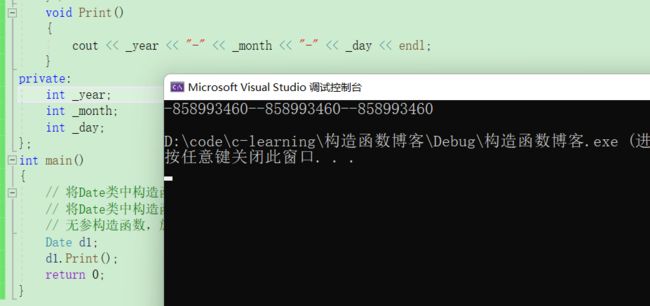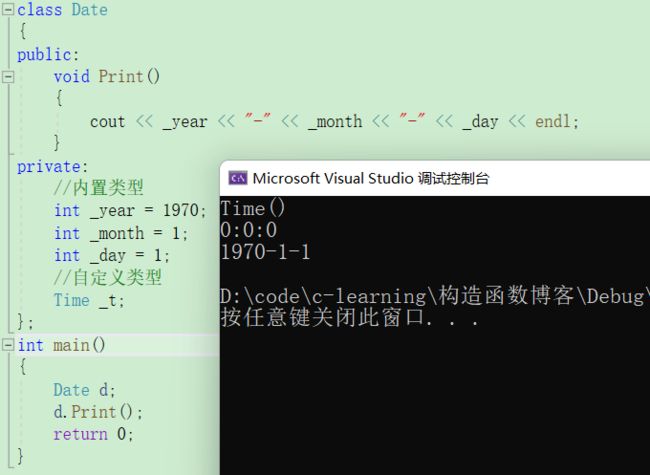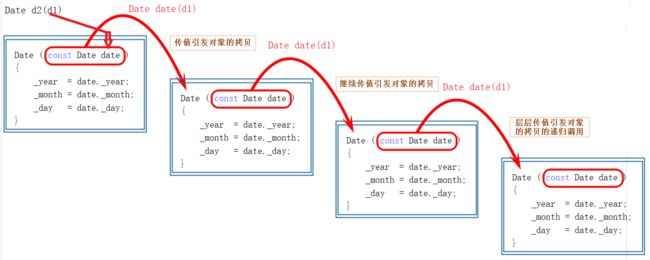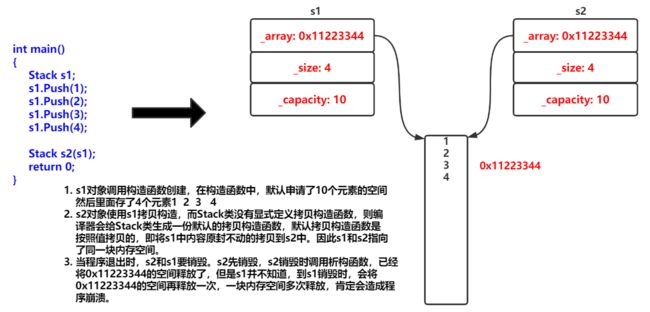【C++初阶】类和对象(二)
大家好我是沐曦希
类和对象
- 1.类的6个默认成员函数
- 2.构造函数
-
- 2.1 概念
- 2.2 特性
- 3.析构函数
-
- 3.1 概念
- 3.2 特性
- 4.拷贝构造函数
-
- 4.1 概念
- 4.2 特征
1.类的6个默认成员函数
空类:类中一个成员都没有
可是空类真的什么都没有吗?
并不是,任何类在什么都不写时,编译器会自动生成以下6个默认成员
函数。
默认成员函数:用户没有显式实现,编译器会生成的成员函数称为默认成员函数。
默认成员函数又称特殊成员函数,我们不写,编译器会自己生成一个,我们自己写了,编译器就不会生成了。
那么对于一些类,当编译器生成的默认成员函数不能满足我们需要时候,我们需要自己写。
对于另一些类,编译器生成的就足够满足我们需要。
class Date
{};
2.构造函数
2.1 概念
对于以下Date类:
#include对于Date类,可以通过 Init 公有方法给对象设置日期,但如果每次创建对象时都调用该方法设置信息,未免有点麻烦,那能否在对象创建时,就将信息设置进去呢?
构造函数是一个特殊的成员函数,名字与类名相同,创建类类型对象时由编译器自动调用,以保证每个数据成员都有 一个合适的初始值,并且在对象整个生命周期内只调用一次。
2.2 特性
构造函数是特殊的成员函数,需要注意的是,构造函数虽然名称叫构造,但是构造函数的主要任务并不是开空间创建对象,而是初始化对象。
其特征如下:
- 函数名与类名相同。
- 无返回值。
- 对象实例化时编译器自动调用对应的构造函数。
- 构造函数可以重载。(提供多个构造函数,多种构造方式)
class Date
{
public:
//1.无参构造函数
Date()
{
_year = 2022;
_month = 10;
_day = 6;
}
//2.带参构造函数
Date(int year, int month, int day)
{
_year = year;
_month = month;
_day = day;
}
private:
int _year;
int _month;
int _day;
};
void TestDate()
{
Date d1;// 调用无参构造函数
Date d2(2022, 10, 7);// 调用带参的构造函数
// 注意:如果通过无参构造函数创建对象时,对象后面不用跟括号,否则就成了函数声明
// 以下代码的函数:声明了d3函数,该函数无参,返回一个日期类型的对象
// warning C4930: “Date d3(void)”: 未调用原型函数(是否是有意用变量定义的?)
Date d3();//在VS2019下不会报错
}
- 如果类中没有显式定义构造函数,则C++编译器会自动生成一个无参的默认构造函数,一旦用户显式定义编译器将不再生成。
#include- 关于编译器生成的默认成员函数,看了上面结果就会有疑惑:不实现构造函数的情况下,编译器会生成默认的构造函数。但是看起来默认构造函数又没什么用?d对象调用了编译器生成的默认构造函数,但是d对_year/_month/_day,依旧是随机值。也就说在这里编译器生成的默认构造函数并没有什么用??
解答:C++把类型分成内置类型(基本类型)和自定义类型。内置类型就是语言提供的数据类型,如:int/char…,自定义类型就是我们使class/struct/union等自己定义的类型,看看下面的程序,就会发现编译器生成默认的构造函数会对自定类型成员_t调用的它的默认成员函数。
内置类型:int/char/double…(包括指针)
自定义类型:class/struct,stack/queue/person等
class Time
{
public:
Time()
{
cout << "Time()" << endl;
_hour = 0;
_minute = 0;
_second = 0;
cout << _hour << ":" << _minute << ":" << _second << endl;
}
private:
int _hour;
int _minute;
int _second;
};
class Date
{
public:
void Print()
{
cout << _year << "-" << _month << "-" << _day << "-" << endl;
}
private:
//内置类型
int _year;
int _month;
int _day;
//自定义类型
Time _t;
};
int main()
{
Date d;
d.Print();
return 0;
}

所以C++对内置类型不做处理,自定义类型会调用他的默认构造函数。
注意:C++11 中针对内置类型成员不初始化的缺陷,又打了补丁,即:内置类型成员变量在类中声明时可以给默认值。
即上面代码的class Date可以改成
class Date
{
public:
void Print()
{
cout << _year << "-" << _month << "-" << _day << endl;
}
private:
//内置类型
int _year = 1970;//这里不是初始化,而是给缺省值
int _month = 1;
int _day = 1;
//自定义类型
Time _t;
};
- 无参的构造函数和全缺省的构造函数都称为默认构造函数,并且默认构造函数只能有一个。注意:无参构造函数、全缺省构造函数、我们没写编译器默认生成的构造函数,都可以认为是默认构造函数。
class Date
{
public:
Date()
{
_year = 1970;
_month = 1;
_day = 1;
}
Date(int year = 1970, int month = 1, int day = 1)
{
_year = year;
_month = month;
_day = day;
}
private:
int _year;
int _month;
int _day;
};
int main()
{
Date d1;
return 0;
}
上面函数是编译通不过的,因为全缺省和无参的构造函数会被认为是默认构造函数,而默认构造函数只能有一个。并且d1调用不明确,不知道应该调用哪一个构造函数。
![]()
补充:
内置类型声明中缺省值可以开辟空间。
class Struct
{
private:
int* a = (int*)malloc(sizeof(int) * 4);
int _top = 0;
int _capacity;
};
3.析构函数
3.1 概念
通过前面构造函数的学习,我们知道一个对象是怎么来的,那一个对象又是怎么没呢的?
析构函数:与构造函数功能相反,析构函数不是完成对对象本身的销毁,局部对象销毁工作是由编译器完成的。而对象在销毁时会自动调用析构函数,完成对象中资源的清理工作。
3.2 特性
析构函数是特殊的成员函数,其特征如下:
- 析构函数名是在类名前加上字符 ~。
- 无参数无返回值类型。
- 一个类只能有一个析构函数。若未显式定义,系统会自动生成默认的析构函数。注意:析构
函数不能重载 - 对象生命周期结束时,C++编译系统系统自动调用析构函数。
typedef int DataType;
class Stack
{
public:
Stack(int capacity = 4)
{
_a = (DataType*)malloc(sizeof(DataType) * capacity);
if (_a == nullptr)
{
perror("malloc fial");
exit(-1);
}
_top = 0;
_capacity = capacity;
}
void Push(int x)
{
_a[_top] = x;
_top++;
}
//其他方法
~Stack()
{
free(_a);
_a = nullptr;
_top = _capacity = 0;
}
private:
DataType* _a;
int _top;
int _capacity;
};
int main()
{
Stack st1;
st1.Push(1);
st1.Push(2);
return 0;
}
- 关于编译器自动生成的析构函数,是否会完成一些事情呢?下面的程序我们会看到,编译器生成的默认析构函数,对自定类型成员调用它的析构函数。
#include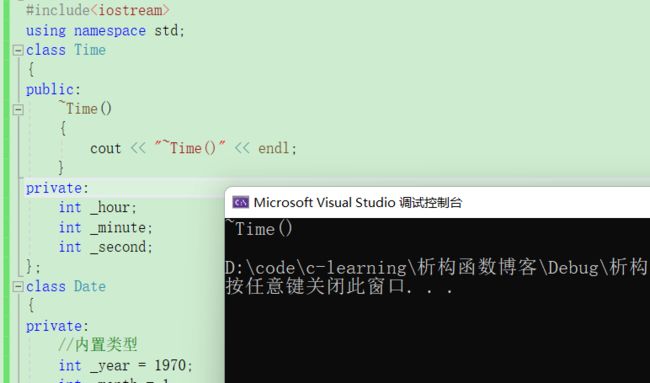
程序运行结束后输出:~Time()
在main方法中根本没有直接创建Time类的对象,为什么最后会调用Time类的析构函数?
因为:main方法中创建了Date对象d,而d中包含4个成员变量,其中_year, _month,_day三个是内置类型成员,销毁时不需要资源清理,最后系统直接将其内存回收即可;而_t是Time类对象,所以在d销毁时,要将其内部包含的Time类的_t对象销毁,所以要调用Time类的析构函数。但是:main函数
中不能直接调用Time类的析构函数,实际要释放的是Date类对象,所以编译器会调用Date类的析构函数,而Date没有显式提供,则编译器会给Date类生成一个默认的析构函数,目的是在其内部调用Time 类的析构函数,即当Date对象销毁时,要保证其内部每个自定义对象都可以正确销毁,main函数中并没有直接调用Time类析构函数,而是显式调用编译器为Date类生成的默认析构函数。
注意:创建哪个类的对象则调用该类的析构函数,销毁那个类的对象则调用该类的析构函数
- 如果类中没有申请资源时,析构函数可以不写,直接使用编译器生成的默认析构函数,比如Date类;有资源申请时,一定要写,否则会造成资源泄漏,比如Stack类。
4.拷贝构造函数
4.1 概念
在现实生活中,可能存在一个与你一样的自己,我们称其为双胞胎。
那在创建对象时,可否创建一个与已存在对象一某一样的新对象呢?
拷贝构造函数:只有单个形参,该形参是对本类类型对象的引用(一般常用const修饰),在用已存在的类类型对象创建新对象时由编译器自动调用。
4.2 特征
拷贝构造函数也是特殊的成员函数,其特征如下:
- 拷贝构造函数是构造函数的一个重载形式。
- 拷贝构造函数的参数只有一个且必须是类类型对象的引用,使用传值方式编译器直接报错,因为会引发无穷递归调用。
#include- 若未显式定义,编译器会生成默认的拷贝构造函数。 默认的拷贝构造函数对象按内存存储按字节序完成拷贝,这种拷贝叫做浅拷贝,或者值拷贝,
即指向同一块空间。
#include
注意:在编译器生成的默认拷贝构造函数中,内置类型是按照字节方式直接拷贝的,而自定义类型是调用其拷贝构造函数完成拷贝的。
- 编译器生成的默认拷贝构造函数已经可以完成字节序的值拷贝了,还需要自己显式实现吗?当然像日期类这样的类是没必要的。那么下面的类呢?
#include
注意:类中如果没有涉及资源申请时,拷贝构造函数是否写都可以;一旦涉及到资源申请时,则拷贝构造函数是一定要写的,否则就是浅拷贝。
- 拷贝构造函数典型调用场景:
1.使用已存在对象创建新对象
2.函数参数类型为类类型对象
3.函数返回值类型为类类型对象
class Date
{
public:
Date(int year, int minute, int day)
{
cout << "Date(int,int,int):" << this << endl;
}
Date(const Date& d)
{
cout << "Date(const Date& d):" << this << endl;
}
~Date()
{
cout << "~Date():" << this << endl;
}
private:
int _year;
int _month;
int _day;
};
Date Test(Date d)
{
Date temp(d);
return temp;
}
int main()
{
Date d1(2022, 1, 13);
Test(d1);
return 0;
}

